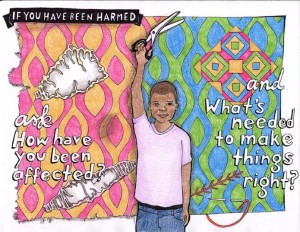culture
Naïve, indeed.
June 3, 2019Diversity Protected
‘White dominant culture has been alive and well for centuries, and its grasp for power is only growing more desperate. Today we see unabashed racism, classism, and sexism at the highest levels of the United States government. How naïve many of us were to think we lived in a post-racial society after the Civil Rights Movement of the 60s and after we saw an African American president and his family in the White House. Now our collective shadow has again come out in the open for all to see.
It seems every generation must be newly converted. While we seek to transform individual hearts and minds we must also work to create change throughout systems. Until a full vision of equity is realized, we must continue naming and resisting the ways in which so many people are excluded and oppressed. Author and activist adrienne maree brown writes:
Separation weakens. It is the main way we are kept (and keep each other) in conditions of oppression. . . . Where we are born into privilege, we are charged with dismantling any myth of supremacy. Where we are born into struggle, we are charged with claiming our dignity, joy and liberation. . . .Adrienne Maree Brown, “Report: Recommendations for Us Right Now from a Future,” Sublevel, issue 2 (2018)
If we remain exclusive monotheists, like Judaism, Islam, and much of Christianity up to now, we normally try to impose a false uniformity on others but rarely know how to love, honor, and respect diversity. We remain in competing tribes and colonies.’
-Richard Rohr, Center of Action & Contemplation
Let’s remake the world with words.
Not frivolously, nor
To hide from what we fear,
But with a purpose.
Let’s, as Wordsworth said, remove
“The dust of custom” so things
Shine again, each object arrayed
In its robe of original light.
And then we’ll see the world
As if for the first time,
As once we gazed at the beloved
Who was gazing at us.
-Gregory Orr
❧
“The beauty of being human is that we are incredibly, intimately near each other, we know about each other, but yet we do not know or never can know what it’s like inside another person.”
-John O’Donohue, Irish poet, author & priest
On Being
Trevor Noah:
The genius of apartheid was convincing people who were the overwhelming majority to turn on each other. Apart hate, is what it was. You separate people into groups and make them hate one another so you can run them all.
[…]
Language brings with it an identity and a culture, or at least the perception of it. The architects of apartheid understood this. Part of the effort to divide black people was to make sure we were separated not just physically but by language as well. Racism teaches us that we are different because of the color of our skin. But because racism is stupid, it’s easily tricked. If you’re racist and you meet someone who doesn’t look like you, the fact that he/she can’t speak like you reinforces your racist preconceptions: He/She’s different, less intelligent. However, if the person who doesn’t look like you speaks like you, the brain brain short-circuits because your racism program has none of those instructions in the code.
-Born a Crime, Stories from a South African Childhood
#InternationalWomensDay
March 8, 2019“Today, we stand at a crossroads: we can continue to live by the blade, risking global annihilation, or we can rediscover the partnership ethic and spirit of co-operation, and use the chalice to transform our culture and our future.”
1987
Riane Eisler
“Some books are like revelations, they open the spirit to unimaginable possibilities. Eisler proves that the dream of peace is not an impossible Utopia.”
-Isabel Allende
“Until I read books like Eisler’s I assumed men ran churches because men run everything…now I realize it goes a lot deeper than that; it is a matter of male mana threatened by female magic.”
-Katherine Whitehorn, The Observer
Asking better questions.
October 25, 2016Cultural Organizing:
This disproportionately harms low income Students of Color, exacerbates the large opportunity gaps that already exist, and fosters what has come to be known as the school-to-prison pipeline.
In response, we have seen rapid growth of the restorative justice movement, which offers a radically different approach. Restorative justice asks that we make a paradigm shift in the way we think about “crime” and “misbehavior.” As Dr. Carolyn Boyes-Watson at the Center for Restorative Justice at Suffolk University explains,
“Rather than privileging the law, professionals and the state, restorative resolutions engage those who are harmed, wrongdoers and their affected communities in search of solutions that promote repair, reconciliation and the rebuilding of relationships. Restorative justice seeks to build partnerships to reestablish mutual responsibility for constructive responses to wrongdoing within our communities. Restorative approaches seek a balanced approach to the needs of the victim, wrongdoer and community through processes that preserve the safety and dignity of all.”
Within this realm, practitioners have developed a wide range of “restorative practices” — such as victim-offender dialogues and peacemaking circles — often drawing on conflict resolution practices from indigenous societies around the world. But restorative justice cannot be reduced to a set of practices. It is a way of thinking about and approaching conflict. It requires a shift in how we relate to one another. It is about developing a restorative culture in our schools and communities.
Shout into the wind.
September 14, 2015Seth Godin:
Anything worth shouting about is worth shouting into the wind.
Because if enough people care, often enough, the word spreads, the standards change, the wind dies down. If enough people care, the culture changes.
It’s easy to persuade ourselves that the right time to make change happen is when it’s time. But that’s never true. The right time to make it happen is before it’s time. Because this is what ‘making’ means.
The most devastating thing we can learn about our power is how much of it we have. How much change we could make if we would only speak up first, not last. How much influence we can have if we’re willing to to look someone in the eye and say, “yes.” Or, “this is our problem, too.” Or, “this must stop.”
Yes, there’s wind, there’s always been wind. But that doesn’t mean we shouldn’t stop shouting.



